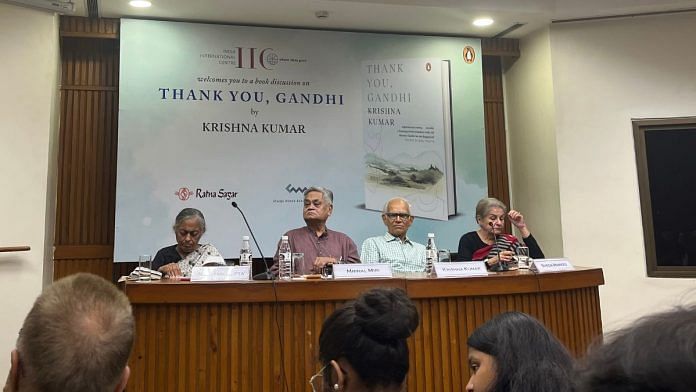New Delhi: Krishna Kumar, Indian academic and former NCERT director, was asked if his latest book, Thank you, Gandhi, is satire. This was followed by a “litany of complaints” against Gandhi, including that he couldn’t save Bhagat Singh and let the Partition happen.
According to Kumar, Gandhi’s endurance lies in his coherence. “It’s the notion, the feeling, that we’re still holding on to a thread, no matter how tenuous it feels,” he said. “That’s what he must be thanked for.”
On the outset, the book may seem anachronistic. But, a discussion at Delhi’s India International Centre (IIC) celebrating its release, featuring historian Naryani Gupta, social activist Syeda Hameed, and philosopher Mrinal Miri, highlighted a Gandhian moral framework, and a style of political organisation that doesn’t always pass muster today.
There were also questions of how Gandhi should be narratavised and remembered –– should he be reduced to a symbol, should his politics and principle subsume him as a person? The answer to the first is a firm no. The second, however, is more complex, as he’s now a combination of memory and history, the panellists agreed.
“Vivid people never die. Even if they’re killed,” said Kumar. “Even if you reduce them to a pair of spectacles.”
A book of contemporary fiction, Thank you, Gandhi is the tale of two characters, narrator K and Munna, a wealthy bureaucrat aghast by the rise of the Hindu Right and how dramatically his country has changed. It looks at epochal moments of modern India –– like the Bhopal gas tragedy and the CAA/NRC protests –– and how they were framed by government response and by a hostile political ecosystem. Essentially, this is not Gandhi’s India.
When methyl isocyanate leaks from a factory, and thousands are killed in a corporate crime of the highest order, Munna joins a Gandhian organisation and begins protesting. Gupta called this and the following: “the years of the great cacophony.”
In Kumar’s world, the country simmers through this period of churn –– but there are also possibilities of a different world.
“He keeps slipping in morals through the book,” said Gupta. “But the fairy tale is here and now. It’s not a linear narrative. But the rigour of history is rarely a straight line.”
Also read: Hindu sanskriti is a form of civilisation. We ignore this period of history—Pavan K Varma
Conquering time
For Syeda Hameed, reading the book was a “dramatic experience.” She was unable to finish it.
“I don’t know where to begin. I just didn’t have the bandwidth to finish,” she said. “You can’t put an ocean in a goblet.”
While technically about Kumar’s imagined version of contemporary times, the discussion, for the most part, was rooted in the here and now. The current government, and the erasure of Indian Muslims from culture and politics.
“I’m too overwhelmed. The book expresses the scenario unfolding in front of us. But it’s done in a detached way, to evoke the readers’ revulsion.”
Criticism of Gandhi was few and far between. Though, Kumar did admit that Gandhi “bamboozled” BR Ambedkar into signing the Poona Pact, something he later regretted. A comment from an audience member drove the discussion toward the relationship between Gandhi and Ambedkar––their discordant ideas on the Indian village, and Gandhi’s acceptance of the caste system, which only evolved toward the end of his life.
“Gandhi was growing all the time, right until his death. One quote can’t be taken out of context,” Kumar said. “It seems that Ambedkar must not be acknowledged as a counter, but as someone who guided him to understanding human misery.”
In his concluding remarks, Miri spoke about Gandhi as having transcended contexts. Context is temporal – and so Gandhi, according to the panellists at least, has succeeded in conquering time.
(Edited by Aamaan Alam Khan)




